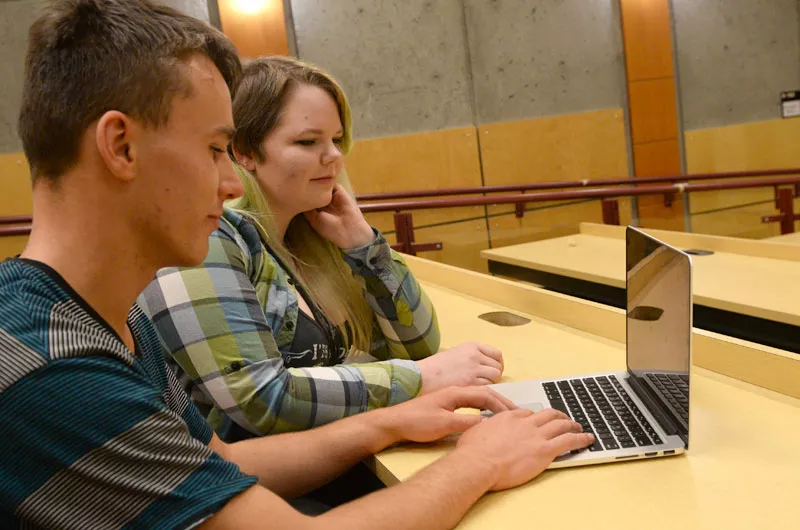High School Students Learn Computer Science Skills to Create Digital Stories

Using their innovative digital storytelling and coding skills, a group of students from high schools in School District No. 91 recently told stories about the Vikings discovering Newfoundland, the Apollo launch and moon landing, and Jacques Cartier’s first voyages to Canada.
Enrolled in Computer Science 199 -- Celebrating the Uniqueness of Northern British Columbia -- 22 students between the ages of 15 to 18 spent a week at the University of Northern British Columbia’s Prince George campus in July.
They used their imaginations where they learned to create simple and complex scenes and actions and transition techniques. Doing their own research to collect data, as well as working as part of a team, they learned skills in animation, visual modelling and narrative programming.
After the intense one-week series of classes on campus were complete, the students returned home and continued to work in groups for the next month on their final projects with remote guidance from UNBC students. The final projects were presented in front of their families and UNBC community one Saturday in August.
The programming and computational thinking skills are all highly valuable for tomorrow’s changing world, said Computer Science Professor Dr. Alex Aravind, the project lead of the course, adding the course helps prepare students for university.
“It’s important to reach out to high school students and teach them these practical problem-solving skills,” said Dr. Aravind. “Even if we get two students from northern remote communities who are hooked on digital storytelling or computer science, that’s important. We’ve got them thinking about the possibilities that are out there.”
“We didn’t set any criteria for entry into the course. Students with different interests could participate and discover how coding could be useful for their interests. The majority of the students said their view on programming changed positively.” said Dr. Aravind, who applied for and received a grant from the Social Sciences and Humanities Research Council of Canada to run the course.
The grant fund was used to hire 10 UNBC computer science graduate and undergraduate students to assist Dr. Aravind in developing and delivering the course, and pay an honorarium for Valerie Walker from Emily Carr University to run the design workshop. This was an eye-opening experience as well for the UNBC students to work directly with high school students.
Students enrolled in the course received both School District No. 91 and UNBC computer science course credits. Also, UNBC offered free tuition as a scholarship to the students, while SD No. 91 covered food and accommodation expenses to spend a week in July on campus at the Neyoh student residence.
Bianca Hankins, a Grade 10 student in Fraser Lake, enjoyed the class. She was part of a team storytelling project that focused on Jacques Cartier’s voyage.
“I liked working with the program and seeing what I could create with it,” she said. “It gave me some ideas what I could do in the future.”
Of the 22 students, four of them were girls and they secured the top-four places in the class and their group projects secured first and third places.
The unique collaboration between School District No. 91, UNBC and Living Labs at Emily Carr University of Art and Design was beneficial for everyone.
“I appreciate the hard work of both UNBC and School District No. 91 staff in planning and completing the Digital Storytelling project,” said Eugene Marks, Superintendent of Schools for School District 91. “We recognize the benefit of having a top-rated university in our region and the opportunities that this creates for our students and school communities.
“The opportunity to earn a UNBC credit while still in high school is a huge benefit to our students and we look forward to collaborating on future opportunities.”
“This is not the first time I am involved with coding related activities for high school students at UNBC,” added Dr. Aravind. “My interest in such activities goes back to Lego Mindstorms workshop I organized at UNBC in 2008, which later evolved into Active Minds computer science camps at UNBC.
“The workshops for 60 girls from Girl Guides Canada and the workshops for Tumbler Ridge students at UNBC were the most memorable ones, and I am looking forward to continue such activities at UNBC in the future.”